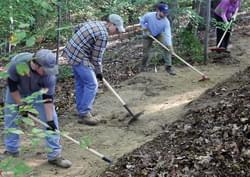




Duke Energy TRAILS at Rockingham Community College is the first community college program of its kind in the United States. Trail design and layout, construction, maintenance, and management skills are the core focus. TRAILS is an acronym for “Trail Recreation and Adventure Institute for Leadership and Service.”

By Tim Johnson, Director, Duke Energy TRAILS at Rockingham Community College
Duke Energy TRAILS at Rockingham Community College is the first community college program of its kind in the United States. Trail design and layout, construction, maintenance, and management skills are the core focus. TRAILS is an acronym for “Trail Recreation and Adventure Institute for Leadership and Service.”
In addition to trail-related skills the program offers a variety of classes that will benefit students, professionals, and volunteers in the fields of parks and recreation and outdoor education. These classes will be helpful for anyone that has an interest in or is responsible for managing natural surface trails.
In an effort to promote education, tourism, the environment, and economic development throughout the recently branded Dan River State Crossings region that spans parts of North Carolina and Virginia, Duke Energy sponsored the TRAILS program with a generous gift of $700,000 in the spring of 2017. Initial course development began during the summer, and classes were scheduled for late summer and early fall.
Rockingham Community College, located in Rockingham County, is about halfway between Greensboro, North Carolina, and Danville, Virginia, in a region once known for tobacco production. With a variety of natural assets like the Smith, Dan, Mayo, and Haw Rivers, three lakes, and two State Parks, the region has turned its attention towards outdoor recreation as part of its next economic development boom. Fieldwork completed by students participating in the TRAILS program will focus on developing outdoor recreation infrastructure in the region to make its attractive natural assets more accessible to residents and visitors alike.
TRAILS is beginning as a Continuing Education program and will develop into an associate’s degree program. Industry professionals and four-year colleges and universities have already expressed interest and excitement for the program, which will fill an existing skills training gap in outdoor-related industries.
Duke Energy TRAILS at RCC has developed a sustainable trail skills training sequence of classes for varying skill levels and interests. The sessions are offered in two formats to meet student needs and time availability.
Longer sessions provide information over multiple day classes and often include additional fieldwork. Shorter sessions provide information through individual classes on single days. Classroom teaching and experiential learning are combined to help students understand the class content in both formats.
Basic trail training classes like Sustainable Trail Design and Layout, Construction, and Maintenance are appropriate for any individual who will be involved in any aspect of natural surface multiple-use trails.
Intermediate level classes include Sustainable Trail Assessment, Permitting and Contracting, and Intermediate Trail Assessment and are targeted towards individuals in management roles who desire to work more effectively with trail professionals.
Advanced trail training classes like Sustainable Trail Construction with Mechanized Equipment are for individuals looking for specific technical trail skills. Additional training topics will be added as the TRAILS program develops, and training programs can be created to meet the specific needs of land management agencies and trail organizations.
The first basic trail skills multiple-day class was offered in mid-October. Only a handful of participants were from the local area with others traveling from as far as 200 miles away. Students from Virginia also attended. Local hotels provided special rates for class participants and students gathered at a restaurant one evening after class for food, fellowship, and networking. Due to the overwhelming interest and response to the class, another section of the same session is scheduled in early December.
This new program will provide valuable and important training in the fields of outdoor recreation and sustainable trail planning, construction, maintenance, and management. It will develop outdoor leaders with the technical skills needed to be successful, and it will also help further expand the recreational opportunities enjoyed by local residents and visitors to the region.
TRAILS at Rockingham Community College program
Learn more about the TRAILS at Rockingham Community College program.